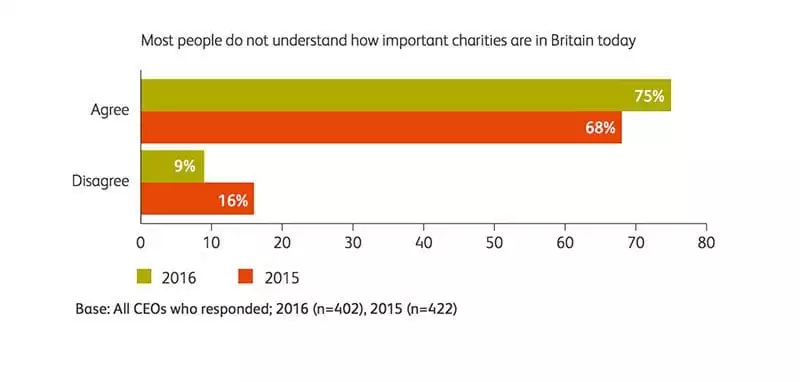Chief executives warn 18% of charities are struggling to survive
The UK’s largest survey of charity chief executives reports that 18% of them fear that their organisation is struggling to survive. The concern is greatest amongst smaller charities, with CEOs at 28% of charities with an annual income of below £1m fearing for their survival.
Charities Aid Foundation’s Social Landscape 2017, published today in association with ACEVO, confirms the result of trends that have been in evidence for some years. Many charities face rising demand for their services in an increasingly tough financial environment. Last year 82% of charities reported such an increased in demand.
Of those surveyed, 35% had had to dip into their reserves last year to cover income shortfalls.
Top concerns
The biggest challenges for charity leaders cited in the research were:
- generating more income and achieving financial sustainability (57%)
- meeting demand for services (36%)
- a reduction in public and government funding (34%)
The rise in demand of charities service is expected to increase over the next 12 months by 86% of CEOs surveyed.
Advertisement
Breaking point?
There is a sense that the current position for some is not sustainable. Overall, the charity leaders surveyed are less confident of their ability to meet these challenges than they were a year ago.
- only 14% said they were completely confident they could cope with growing demand
- 26% had little or no confidence their organisation could meet with growing demand
What are the biggest challenges for charities in 2017? Here's everything you need to know in just over a minute #charitytuesday pic.twitter.com/5yuaw9sePf
— Charities Aid Foundation (CAF) (@Caf) February 28, 2017
How have charities responded so far?
Common responses to the challenges from charities have included restructuring, downsizing and joining forces with other organisations.
- 61% say they either have restructured in the past 12 months or will be doing so in the next 12 months.
- 33% have reduced or are set to reduce staff numbers and downsize the organisation over the same period.
- 28% say they have or will be reducing front-line services. This compares to 19% who said this was a case when the same research was carried out in 2015.
Mergers and partnerships are another response.
- 10% of leaders surveyed have plans to merge with another organisation over the next 12 months.
- 76% say they have or will be partnering with another not-for-profit
- 49% say they have or will be collaborating with a private sector organisation.
Charities are making efforts to turn things around.
- 85% have recent or upcoming plans to increase their social media presence
- 79% are investing in new IT and online solutions
- 59% are introducing new methods of giving

Most CEO’s don’t believe the UK public realises how important charities are to the UK.
The survey
The survey involved questions that CAF asked charities as part of the Association of Chief Executives of Voluntary Organisations (ACEVO) Pay and Equalities Survey 2016, which collected information from chief executive officers of organisations in the voluntary sector. The CAF questions were asked of 472 respondents completing the ACEVO survey.
Those surveyed included cover “a good breadth of organisations” from across the different parts of the charity world in England, Scotland, Wales and Northern Ireland, including smaller organisations.
“Ever-growing pressure on already-stretched resources”
John Low, Chief Executive of the Charities Aid Foundation, said that “all of us have a stake in how the voluntary sector is faring”.
He added:
“In 2017 charities are facing ever-growing pressure on already-stretched resources. They are less confident than they were a year ago that they’ll be able to meet this demand. In some cases they are being stretched to breaking point. Faced with tough times, charities are restructuring, reducing staff and in some cases adapting their mission…
“At this pivotal time as we prepare to leave the EU, charities have a big role to play shaping British society. It is essential that MPs and policymakers work with the voluntary sector and acknowledge the pressures charities are facing if we are to get the full benefit of charities’ experience and expertise in the uncertain times ahead.”
Vicky Browning, Chief Executive of ACEVO, concurred, saying:
“The Social Landscape Report provides evidence that charities are facing a perfect storm of rising demand and decreasing funds in a time of challenging economic conditions and volatile public trust. It is essential that local and national government work to protect the longer term capacity of the voluntary sector and the irreplaceable role that these organisations play in our communities.”
You can download The Social Landscape 2017 report in PDF.
- CAF have also published a 2019 edition of this report at The Social Landscape 2019.



